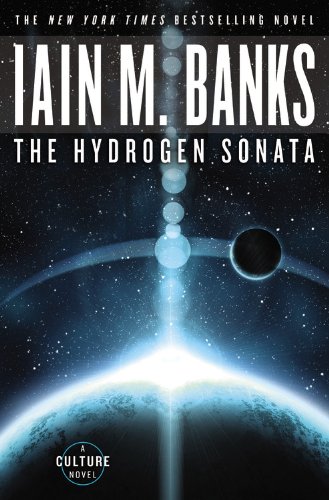Book Review: Iain M. Banks’ “The Hydrogen Sonata”
by Miles Raymer
It is fitting that the final Culture novel should ruminate so radiantly on matters of longevity and disembodiment, but disappointing that it should also be so decidedly dull. I’ve long considered Iain M. Banks to be one of the brightest stars in the sky of scifi authorship, but this visit to the Culture universe failed to consistently command my attention. The Hydrogen Sonata, like its eponymous musical arrangement, is a desultory and cacophonous experience graced with intermittent windows of inspiration.
Banks’ most bothersome blunder stems from a glaring inconsistency in the appeal of the novel’s many plot threads, most of which meander at length before lapsing into unsatisfying conclusions. The central plot follows Cossont, a four-armed Gzilt woman who––with the aid of the Culture––must reconnect with an old friend to uncover sensitive information about the provenance of the Gzilt holy book, mere days before her civilization’s chosen date for Sublimation. This compelling premise is bogged down by a host of ancillary intergalactic squabbles that take more away from Cossont’s journey than they add to it. While Banks’ interwoven narratives are somewhat difficult to follow, they also suffer from a much more critical flaw: they don’t provide nearly enough emotional mass to keep the reader’s attention in close orbit.
Another problem is Banks’ stale characterization, which has never been the strongest point of the Culture series. The Hydrogen Sonata contains a hefty cast of characters and Minds, most of which are entirely forgettable. Even during the book’s climax, I found myself reading sections about characters with whom I was only vaguely familiar. This was not due to lack of information, but rather my own indifference. I’m not sure if I should criticize or credit Banks for including discussions between Minds that serve as condensed recountings of the book’s main events. These sections kept me abreast of important developments but also catered to my lazier tendencies as a reader. Eventually, I realized I could selectively follow the main story and ignore the rest without feeling like I’d missed much.
Although The Hydrogen Sonata never came together for me as a whole story, it certainly offered the smorgasbord of tantalizing lucubrations Culture travelers learn to expect. Banks expands on his concept of the Sublime more thoroughly than in previous works, giving as close to a clear picture of it as is probably possible, given the idea’s inherent fuzziness: “Parcelled, rolled, compressed, and enfolded into the dimensions beyond the dimensions beyond the ones you could see and understand…unutterably microscopic, unassailably far away but at the same time everywhere, shot through the fabric of space-time…In dimensions seven to eleven; that was where the Sublimed lay” (17). This is one of Banks’ most wildly inventive and fun ideas. The Sublime is a kind of pure energy-based nirvana into which civilizations dissolve when they feel ready to disassociate themselves from physical embodiment: “The absolutely most splendid wonders, experiences and achievements of the Real and all those within it were as nothing to the meanest off-hand meanderings of the Sublime. The most soaring, magnificent, ethereal cathedrals to reason, faith or anything else were as mere unkempt and dilapidated hovels compared to the constructions…within the Sublime” (64). Is this just Banks’ version of the rapture of the nerds? Of course. Am I completely smitten by it? Absolutely.
The most effulgent jewel hidden within this bloated novel is a Culture citizen named QiRia––a man who, through extensive and experimental use of technology, has lived for more than ten millennia. QiRia is a refreshingly vivid character, as good a symbol for wisdom and whimsical cantankerousness as any I’ve previously encountered. Though Banks devotes fewer pages to QiRia than to many less deserving characters and topics, there are plenty of opportunities for QiRia to trot out his philosophical chops:
QiRia on love: “Love generally comes from a need within ourselves…expression of love is what is most important to us, not the identity, not the personality of the one who is loved” (174). On acceptance of folly: “Once one survives the trough that comes with the understanding that people are going to go on being stupid and cruel to each other no matter what…then one starts to take the attitude, Oh well, never mind…let’s make the most of it. Let’s see what fresh fuckwittery the dolts can contrive to torment themselves with this time” (211). On confidence, knowledge and ignorance: “For real-time centuries I will feel, say, gradually more secure in myself, then for the next few centuries I’ll feel less certain. Or over time I’ll go from thinking I know pretty much everything to realising I know next to nothing, then back again, and so on and so on” (319).
All of these truisms could be explored in the first lecture of an introductory philosophy course, yet QiRia makes them seem as if they are the genuine products of centuries upon centuries of lived experience rather than the musings of one particularly gifted human author.
Given the few and far betweenness of its most enlightening moments, The Hydrogen Sonata does not stack up against the very best Culture novels. Thankfully, Banks closes out the book with a meaningful parting thought: “You should always tell the truth, unless you find yourself in a situation where it would be utter moral folly to do so” (505). This is a lesson almost everyone learns but nobody masters, one that we therefore ought to be regularly tricked into revisiting. Despite the scattered method, I’m grateful to Banks for getting me there.
Rating: 6/10
